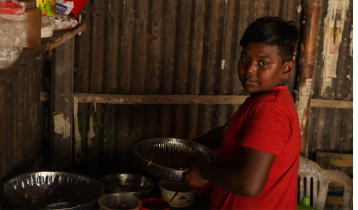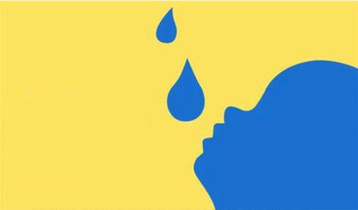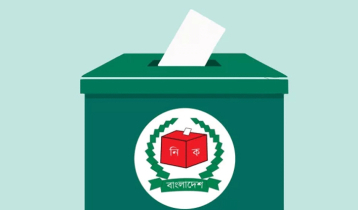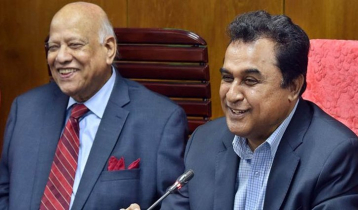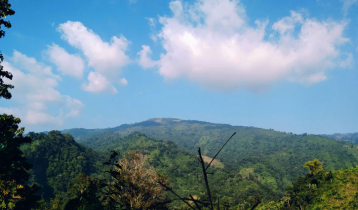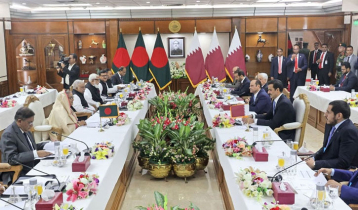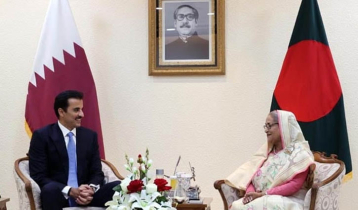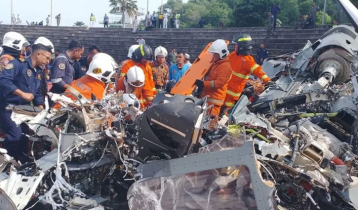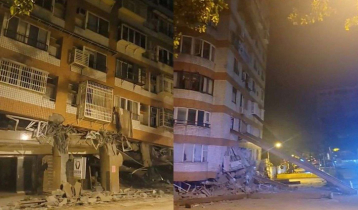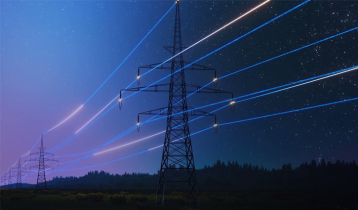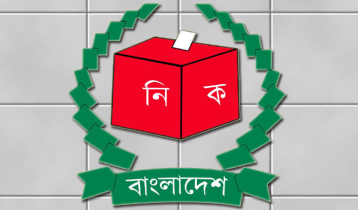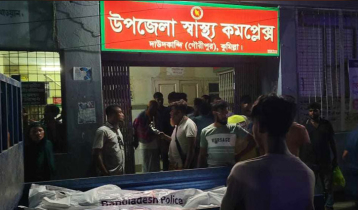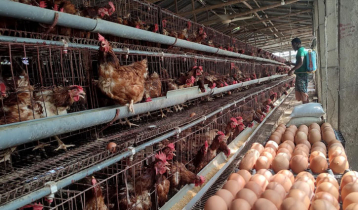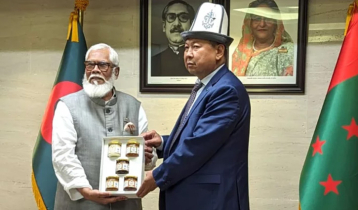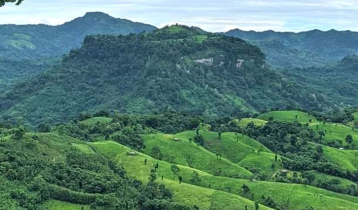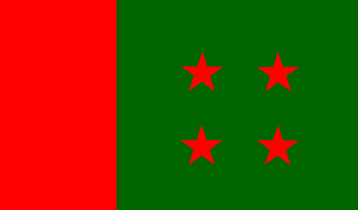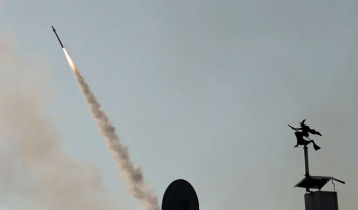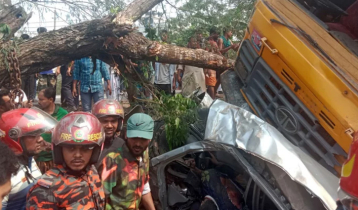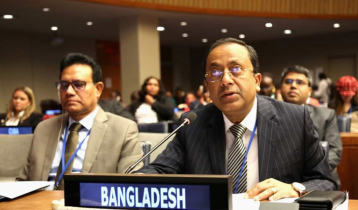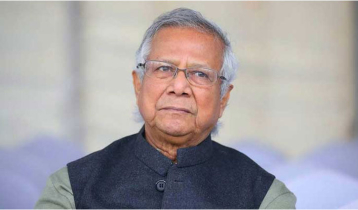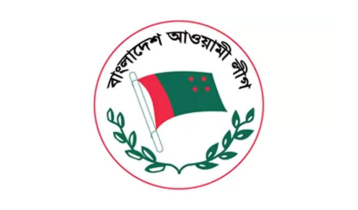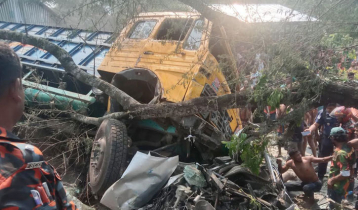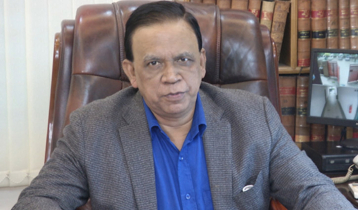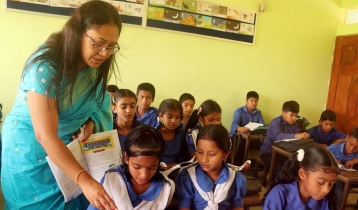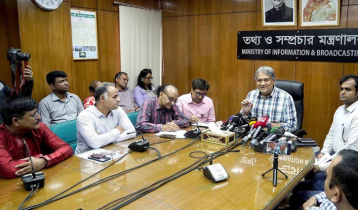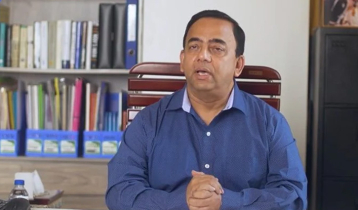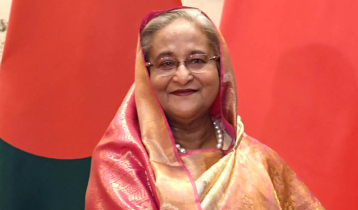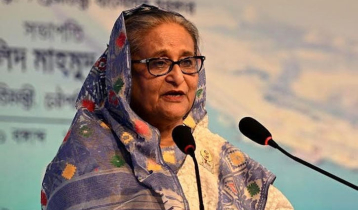Prime Minister’s India visit: Jointly agreed decisions
Hasan Mahamud || risingbd.com
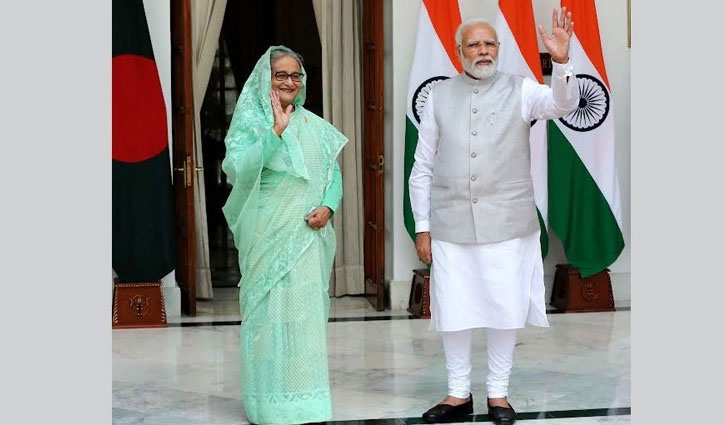
After three years, Prime Minister Sheikh Hasina visited India. Various points and aspects of her visit are being discussed as the visit was very important for the Awami League before one year of the national election. The expectations and achievements are being analyzed in the political arena.
Analysts say Sheikh Hasina’s visit was politically important for her government and the Awami League but there arises many questions and criticisms for not addressing issues of Bangladesh’s interest. However, the Ministry of Foreign Affairs is not agreed to see the visit from the political perspective.
7 MoUs inked
Seven memorandums of understanding (MoUs) were signed between Dhaka and New Delhi on Tuesday (September 6). Documents of the MoUs were exchanged in presence of the two prime ministers of both the countries.
These MoUs are: MoU on withdrawal of 153 cusec water from Kushiyara River by Bangladesh under Upper Surma-Kushiyara Project, Sylhet via Rahmipur, MoU on Scientific Cooperation between Council of Scientific and Industrial Research (CSIR), India and Bangladesh Council of Scientific and Industrial Research (BCSIR), MoU between National Judicial Academy, Bhopal, India and Supreme Court of Bangladesh, MoU between Ministry of Railways, India and Bangladesh Railway for training of Bangladesh Railway personnel at the training institutes of Indian Railway, MoU between Ministry of Railways, India and Bangladesh Railway for collaboration for IT solutions for Bangladesh Railway and MoU between Prasar Bharati and Bangladesh Television and MoU on cooperation in the areas of Space Technology.
A bilateral talk between Bangladesh Prime Minister and her Indian counterpart was held at the Hydrabad House prior to signing of the MoUs. Issues involving mutual interests on security cooperation, investment, enhanced trade relations, power and energy sector cooperation, water sharing of common rivers, Rohingya, water resources management, border management, combating drug smuggling and human trafficking were top agendas during the talks.
Professor of the International Relations Department of the Dhaka University Dr Imtiaz Ahmed said that the visit was very important as the two countries are close neighbors, also carries importance due to the geopolitical issue. However, this visit took place when various factors including national election and economic issues are visible important issues. The visit was also very important in the context of the ongoing global economic crisis due to the Covid-19 pandemic and the Russia-Ukraine war. The two neighbors discussed the matters with a view to overcoming the crisis.
During four-day visit of Prime Minister Sheikh Hasina to India, jointly agreed decisions are:
Steadfast Friendship
➢ Emphasis on greater collaboration in the spirit of friendship and partnership for prosperity and development of the region.
Key decisions to enhance intra-Bangladesh Rail connectivity:
➢ Appreciation for ongoing bilateral initiatives, such as:
- Conversion to dual-gauge of Tongi-Akhaura line
- Supply of railway rolling stock to Bangladesh Railway
- Capacity building for the personnel of Bangladesh Railway in reputed training institutes of Indian Railways
- Sharing of IT solutions for improved services of Bangladesh Railway
New initiatives to enhance Bangladesh-India Rail connectivity include:
- Kaunia-Lalmonirhat-Mogalghat-New Gitaldaha link
- Establishing a link between Hili and Birampur
- Upgradation of track and signaling systems and railway stations along the Benapole-Jashore line
- Link restoration between Burimari and Changrabandha
- Construction of a container depot at Sirajganj etc
➢ Importantly, for these forward-looking projects, Bangladesh and India have agreed to explore funding through multiple financial instruments under the bilateral development cooperation framework.
➢ Upon Bangladesh's request, India has committed to provide 20 broad-gauge diesel locomotives to Bangladesh, on grant basis
Safeguarding from global economic shocks
➢ A special G-2-G arrangement for predictable supply of essential food commodities such as rice, wheat sugar, onion, ginger and garlic from India to Bangladesh is expected to be worked out between both countries.
Facilitating smooth movement of people and goods
➢ Expediting completion of developmental works within 150 yards of the International Border, including critical immigration and trade-related infrastructure on the various border crossings along the over 4,000-kms long border.
Border Security and Management
➢ For the maintenance of a tranquil and crime-free border, completion of fencing along the unfenced patches of the entire border, beginning with the Tripura Sector, was agreed between both Leaders.
➢ Stepped up efforts by border guarding forces has helped decrease the number of deaths at the border. Greater cooperation against smuggling of arms, narcotics and fake currency and to prevent trafficking, particularly of women and children was also appreciated.
Committed to jointly fight against terrorism
➢ Both Leaders reiterated their strong commitment to eliminate terrorism in all its forms and manifestations.
➢ Further strengthening cooperation to counter and prevent the spread of terrorism, violent extremism and radicalisation in the region and beyond was agreed.
Defence and Security Cooperation
➢ Early finalization of projects under the USD 500 mn Defence Line of Credit was agreed, including the procurement plans of vehicles for Bangladesh Army.
➢ Early operationalization of the 2019 MOU on Coastal Radar System for enhanced maritime security.
Riverwater Cooperation
➢ Convening of the Joint Rivers Commission Ministerial Meeting, after more than a decade, where progress on cooperation on all shared rivers was reviewed, was appreciated by the Leaders.
➢ With the cooperation of all stakeholders in India, including the State Govt of Assam, the Kushiyara MOU has been signed. It will help Bangladeshi farmers irrigate land in Northeastern Bangladesh during the dry season and similarly, Southern Assam is expected to benefit from it.
➢ Bangladesh noted request from State Govt of Tripura on sharing of the Feni river water.
➢ Drinking Water project for the people of Tripura will now soon operationalize with the necessary approvals and clearances provided by Bangladesh to activate the 2019 MOU on withdrawal of 1.82 cusecs of water from the Feni river.
➢ Greater number of rivers will now be included for data exchange and formulating framework of interim water sharing agreements.
➢ Formulation of Joint Technical Committee to conduct a Study for optimum utilization of Ganges Water agreed by both sides.
➢ Bangladesh reiterated request to conclude Teesta Treaty finalized in 2011.
➢ Both sides agreed to enhance cooperation on tackling river pollution, improving riverine environment and navigability.
Power Cooperation
➢ Synchronous Grid Connectivity – Bangladesh-India JV on Special Purpose Vehicle to connect a high capacity 765 kV transmission line from Katihar (Bihar) to Parbatipur (Bangladesh) to Bornagar (Assam). This line is expected to facilitate both import and export of electricity by Bangladesh, as per seasonal demand.
➢ Sub-regional power grid connecting Nepal, Bhutan and Bangladesh got a boost. India informed that its internal guidelines are in place for the setting up of such a network.
Energy Cooperation
➢ To help address Bangladesh’s energy needs, both sides hoped for the early completion of the transboundary India-Bangladesh Friendship Pipeline that will carry High Speed Diesel from India directly to Bangladesh.
➢ To meet the growing requirements of petroleum products for Bangladesh’s economy, India agreed to facilitate preliminary discussions between authorized agencies of both countries.
➢ India thanked Bangladesh for the support extended to facilitate movement of Petroleum, Oil and Lubricants from Assam to Tripura via Bangladesh, in light of the devastating flood situation in Assam and Meghalaya this year.
➢ Indian Oil Corporation Ltd (IOCL), a Govt of India PSU, is now eligible to supply on G-2-G basis petroleum products to Bangladesh.
Development Cooperation
➢ Bangladesh lauded India for the efficiency and speed with which funds disbursement under Govt of India-linked Lines of Credit have taken place, especially over the last year. Close to USD 1.1 billion of the concessional aid extended to Bangladesh has already been disbursed.
➢ Bangladesh is India’s topmost development partner. Bangladesh alone caters for about one-fourth or 25% of all development financing extended by India to other countries.
Enhancing Bilateral and Sub-Regional Trade and Connectivity
➢ Both Leaders agreed to expedite efforts to operationalize Bangladesh-Bhutan-India-Nepal Motor Vehicles Agreement. Once agreed, seamless movement of vehicles, personal and commercial, will be possible across borders of the four countries.
➢ To enhance sub-regional connectivity, India proposed preparation of a Detailed Project Report on a new highway connecting Hili (West Bengal) via Bangladesh to Mahendraganj (Meghalaya). In this context, Bangladesh also proposed its participation in the India-Myanmar-Thailand Trilateral Highway.
➢ Inviting Bangladesh’s business community to utilize the free transit offered by India through specified Land Customs Stations/Airports/Seaports on its territory, India welcomed Bangladeshi exports to third countries. This is over and above the free transit already in place for Bangladeshi businesses exporting to Nepal and Bhutan.
Mutually beneficial two-way trade
➢ Successful trial runs under the 2015 Agreement on Use of the Chattogram and Mongla Port have been completed.
➢ Maitri Bridge connecting Bangladesh with India’s Tripura also awaits operationalization and India requested Bangladesh to expedite completion of remaining infrastructure, immigration and customs facilities at Ramgarh.
➢ To enhance two-way business, removal of port restrictions imposed by Bangladesh on Indian goods was again emphasized on.
➢ Both sides directed trade officials to start negotiations on a Comprehensive Economic Partnership Agreement within 2022 and complete the same before 2026, when Bangladesh graduates from its LDC status and to retain the Duty Free Quota Free benefits it currently enjoys.
➢ To facilitate movement of goods between Bangladesh and India, India’s proposal to fund and build a second freight gate at the country’s busiest landport, the Benapole-Petrapole ICP, was welcomed by Bangladesh.
Bangabandhu and Spirit of 1971 Liberation War
➢ The jointly produced biopic on Bangabandhu, Mujib – the making of a nation – is likely to complete soon and be launched next year.
➢ Joint Production of a Documentary on the Liberation War and Joint compilation of rare video footage was agreed.
➢ Deep appreciation for India’s gesture to provide medical treatment provided to over 100 Bangladesh’s Muktijoddhas at prestigious Indian hospitals, on gratis basis, since 2018.
Futuristic Areas of Cooperation
➢ First visit of a Start Up delegation from Bangladesh to India.
➢ Joint Conservation of the Sunderbans.
➢ Augmenting cooperation in peaceful use of outer space, green energy, peaceful uses of nuclear energy, and technology enabled services in finance, health and education.
Regional Issues
➢ India expressed appreciation at the generosity of Bangladesh in sheltering and providing humanitarian assistance to over a million persons forcibly displaced from the Rakhine State in Myanmar and underlined its continuing commitment to ensure the safe, sustainable, and expeditious return of these forcibly displaced people to their homeland.
➢ India appreciated the contribution of Bangladesh in hosting the BIMSTEC Secretariat and developing its infrastructure. The Indian side reiterated its support to Bangladesh in its capacity as the Chair of Indian Ocean Rim Association (IORA).
Dhaka/Mukul

